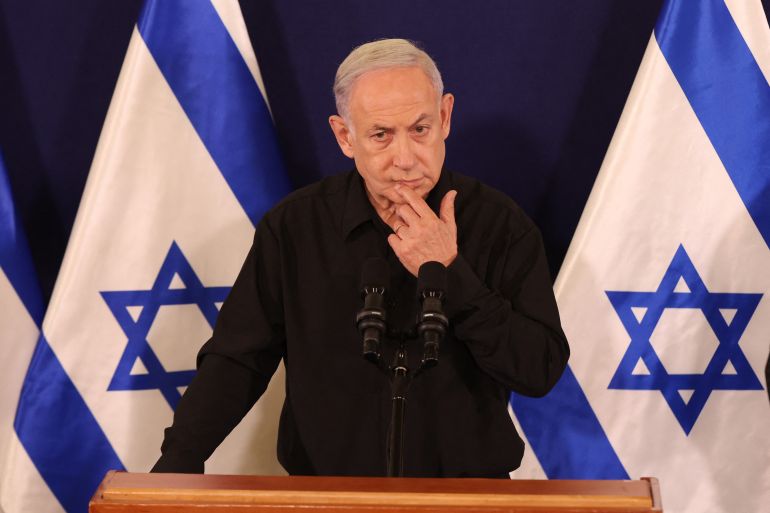Netanyahu’s corruption trial resumes amid Israeli war on Gaza. What to know
Netanyahu, who did not attend Monday’s hearing, has described charges against him as a ‘witch-hunt’.

A corruption trial against Israeli Prime Minister Benjamin Netanyahu resumed on Monday after a two-month pause due to the continuing Gaza war. He did not attend the hearing.
Netanyahu has been charged with fraud, bribery and breach of trust in three cases filed in 2019. He can be sentenced to up to 10 years in jail and/or a fine if convicted in a bribery case.
Keep reading
list of 3 itemsIsrael’s opposition leader calls on Netanyahu to resign over Hamas attack
Corruption trial of Israeli PM Netanyahu resumes
Here is what there is to know:
When did the corruption trial start?
The first session of Netanyahu’s corruption trial was on May 24, 2020. The trial has been prolonged because it was initially paused due to COVID-19 and more recently, because of Israel’s war on Gaza following the October 7 attack by Hamas.
What are the charges against Netanyahu?
Then-Attorney General Avichai Mandelblit announced the Israeli prime minister’s indictment on November 21, 2019. The investigations were listed as cases 1000, 2000 and 4000.
- Case 1000 alleges that Netanyahu, 74, and his wife, Sara, 65, have received lavish presents from prominent Israeli Hollywood producer Arnon Milchan and Australian billionaire businessman and Israeli citizen James Packer in return for political favours. This case charges the Israeli PM with fraud and breach of trust. Fraud and breach of trust carry a prison sentence of up to three years while bribery charges carry a sentence of up to 10 years in jail and/or a fine. Milchan testified that he provided gifts to Netanyahu in June 2020.
- Case 2000 accuses Netanyahu of negotiating with Israel’s leading daily, Yedioth Ahronoth, for favourable coverage in exchange for legislation that would slow the growth of a rival newspaper. This case also charges him with fraud and breach of trust.
- Case 4000 indicts Netanyahu for granting regulatory favours to Israel’s leading telecommunications company, Bezeq Telecom Israel, in return for positive coverage of him and his wife on a news website controlled by Bezeq’s former chairman, Besides fraud and breach of trust, Netanyahu has been charged with bribery in this case.
Netanyahu, who is the first sitting Israeli prime minister to face court as a defendant, has denied any charges and claimed that the indictments were part of a politically charged witch-hunt against him by his rivals to remove him from office.
Can Netanyahu be removed from office?
He can only be removed from office if convicted, which can also lead to him being sentenced to punishment. Netanyahu and the state could each choose to appeal the ruling. Doing so would take the case to the country’s Supreme Court, further prolonging a resolution.
Netanyahu, who faced months of protests against his controversial judicial overhaul plan, has been accused of using the legislation to circumvent his legal troubles.
The high-profile trial is expected to last several more months. An appeal process, if necessary, could take years.
What are the latest updates on his trial?
The Israeli leader is exempt from attending the court hearings, but he may be asked to testify within a few months, according to Yedioth Ahronoth newspaper.
Minister David Amsalem of Netanyahu’s Likud party called the resumption of proceedings during the war “a disgrace”.
“War? Captives? … No, no. The most important thing now is to renew Netanyahu’s trial,” Amsalem posted on X on Sunday.
Netanyahu remains highly unpopular and many Israelis blame him for security lapses leading to the October 7 Hamas attack – the deadliest since Israel’s founding in 1948.
Netanyahu, the longest-serving Israeli prime minister – brought far-right Israeli politicians into government and boosted illegal settlements on Palestinian lands – pushing aside the political process for a Palestinian state as envisaged in the Oslo Accords of the 1990s.
Long before the current war erupted, the killings of Palestinians by Israeli forces and settler violence had skyrocketed.